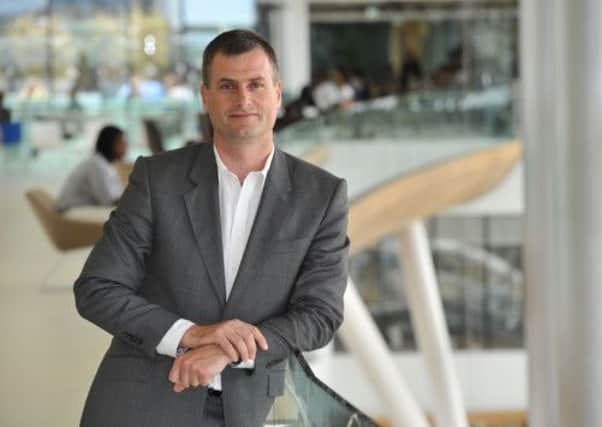SMEs may benefit quicker in the 4G rollout


Ronan Dunne, chief executive of O2 Telefónica UK, was speaking to the Yorkshire Post ahead of the next phase of O2’s 4G roll-out to cities including Sheffield on September 27. Leeds, Bradford and London were the first cities to see the operator’s super-fast mobile service launched at the end of August.
“For digital economy in the broad sense you need three things, you need great digital infrastructure, you need digital literacy, which is something O2 talks about a lot and is people having digital skills, and you need to bring the technology to life by putting great products and services on it, so you need to do all three.
Advertisement
Hide AdAdvertisement
Hide Ad“So what we’re talking about with the launch of 4G is that one of the essential ingredients that’s been missing from the digital economy, which is really ubiquitous, any time, any place, anywhere access to high speed data, is now being addressed by 4G,” said Mr Dunne.
O2 has some catching up to do as rival operator EE has built up a big lead over rivals since starting to roll out its 4G services last October.
Mr Dunne said that O2, owned by Telefónica, is carrying out a “fast” roll-out of its 4G services, which will be available in 13 cities, or 30 per cent of the population, by Christmas. EE said last month its 4G service was available in more than 100 British towns and cities.
Mr Dunne said: “We expect the rate of adoption to be much faster than 3G. In the first week of the service the data traffic on the 4G network reached what we did in the whole year of 2007 on the 3G network (which was four years after O2’s launch of the 3G ser-vice).”
Advertisement
Hide AdAdvertisement
Hide AdEE, a joint venture between Orange and Deutsche Telekom, said earlier this month it had signed up one million subscribers for the superfast broadband connections, beating its year-end target. When O2 and Vodafone launched their 4G mobile offerings last month, they both used sports and music content to make their services distinctive. Neither has released a target for customer take-up.
Mr Dunne, who was in Bradford yesterday at the National Media Museum to meet the Government’s Minister for Culture, Communications and Creative Industries, Ed Vaizey, said that there were two key reasons for Leeds and Bradford’s inclusion in O2’s 4G launch.
“One is Yorkshire is a huge part of our heritage. As O2 we are a huge employer in the region, we’ve been based here from the get-go and also there’s a perception sometimes that everything happens down South first and comes elsewhere after so we wanted to make a very positive statement that the opportunity of rolling out 4G wasn’t just a London opportunity, it was for everybody.”
Mr Dunne added: “A business in Yorkshire can be competing with businesses anywhere else in the UK but can also compete with businesses anywhere else in the world by being online and having great connectivity.”
Advertisement
Hide AdAdvertisement
Hide AdMr Dunne said that the speed at which the UK is rolling out 4G means it can not only catch up with other European countries which carried out launches earlier, but can “get ahead again”.
EE chief executive Olaf Swantee has claimed that the operator has seen one of the fastest 4G adoption rates in the world.
Vodafone said it would launch in five more cities, beyond London, including Birmingham and Sheffield, on September 28. EE, meanwhile, has offered super-fast 4G mobile data in Sheffield since October last year.
In a sign of increased competition in an emerging market place, business telecoms firm Intouch Advance, which is partnered with EE, is providing 4G WiFi free of charge to commuters at Leeds railway station on September 23 and 25, during Leeds Business Week. InTouch Advance will be providing the 4G speeds from its MiFi device. MiFi provides 4G mobile broadband to up to 10 separate devices – such a laptop, tablet, e-reader and smartphone.
Launch of the next generation
Advertisement
Hide AdAdvertisement
Hide Ad4G is the fourth generation of mobile phone technology and follows on from 2G and 3G.
2G technology was suitable for making calls and sending text messages while 3G makes it possible to access the internet more effectively through a mobile phone.
4G services should make it much quicker to surf the web on mobile, tablets and laptops.
Because of this, 4G is suitable for services which demand more capacity like video streaming and mapping. For the typical user, download speeds of initial 4G networks could be around five to seven times those for existing 3G networks.
Source: Ofcom